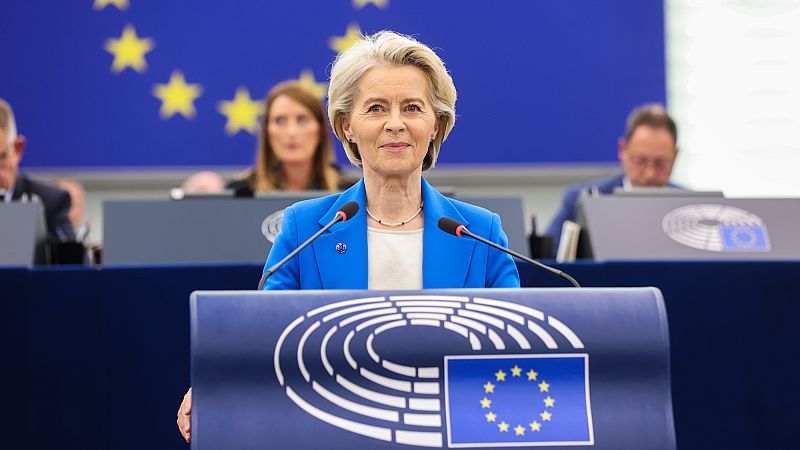Von der Leyen emerged 'strengthened' from motions of censure — for now

After the high noon vote in Strasbourg on Thursday, European Commission President Ursula von der Leyen has emerged not weakened but strengthened from the latest motions of censure in the European Parliament — and, crucially for the German politician, her centrist coalition has held firm.
A total of 378 and 383 MEPs backed her Commission against two separate motions of censure tabled by the far-right and far-left groups.
The show of hands represents not only more support than in the previous no-confidence vote in July, but also higher than the 370 votes that confirmed her college of commissioners at the start of this legislature in November 2024.
The results suggest that the so-called centrist majority — along with most MEPs from the Greens/EFA and the European Conservatives and Reformists (ECR) groups — rallied behind the von der Leyen Commission II in the face of accusations of trade policy, power-grabbing, and a lack of transparency.
The tone was set by the Greens/EFA co-chair Bas Eickhout.
“If we are looking now at the situation in the world, sending away the European Commission is not a smart thing to do," Eickhout told Euronews.
"We have problems, we have discussions, we are not happy with this simplification agenda ... but that is not a reason to send off the entire European Commission”, the Dutch lawmaker explained.
Three motions of censure in three months
The reality is that, for many different reasons, MEPs have not given Ursula a break for quite some time, but von der Leyen has acted differently since MEPs challenged her Commission back in July.
Since then, the German lawmaker has acted on the Israel-Hamas war, appealed to those in the centre during her yearly State of the Union address, and is currently discussing the 2026 Commission’s work programme with the European Parliament, experts have noted.
“My feeling was that lots of MEPs from the centre thought to themselves, okay, let's wait and let's give her the chance to walk the talk,” Sophia Russack, research fellow at the Brussels-based think tank CEPS, told Euronews.
“It wouldn't be strategic for us now to punish her if she's kind of at least indicating that she's going in the right direction.”
Over the last months alone, the European Commission chief has faced three motions of censure, legal action for sidelining MEPs over the €150 billion defence loans scheme, as well as criticism from several corners over the Mercosur and the EU-US trade agreements.
Most of the opposition has come from The Left and the far-right group Patriots for Europe — and neither shows any sign of backing down.
“We are not giving up,” MEP Manon Aubry, leader of The Left group, told Euronews, despite her motion receiving only 133 votes in favour — far short of the threshold needed to topple the Commission.
The Patriots for Europe (PfE), whose own motion of censure secured the backing of 179 MEPs, also appears unwilling to throw in the towel.
“This is a process, (the motion) was a way to put pressure on von der Leyen and to show her weak points. We will continue this strategy until she understands that she cannot continue”, Portuguese MEP António Tanger Corrêa (PfE) told Euronews, foreseeing “more votes of confidence to come”.
CEPS' Russack noted that the far-right group never expected the European Commission to actually step down.
“They knew that this is the majority that they couldn't reach, but what the far-right is most concerned about is undermining the institutions and undermining their legitimacy,” Russack argued.
More battles to come?
Yet, the German Christian Democrat has reached a point where she is facing criticism from within her own ranks.
The next major battle in Parliament is expected to centre on the Commission’s proposal for the EU’s long-term budget for 2028–2034 — a €2 trillion plan known in Brussels jargon as the Multiannual Financial Framework (MFF).
In a very controversial move, the EU executive proposed in July merging agricultural and regional funds into a single pot to be managed by national governments.
Since then, member states have criticised the size and design of the ambitious proposal, and MEPs have blatantly opposed this decision.
“Right now, the debate within the (EPP) group is very heated,” Italian MEP Salvador de Meo (EPP), said during an interview with Euronews in Strasbourg.
The EPP fears that merging the EU’s two most significant budget funds into a single pot could lead to misuse of money, underfunding for companies and citizens who rely on them, and a diminished role for the regions.
“It is a mistake to backtrack on (the Common Agricultural Policy) that has been a real tool for European integration, enabling millions of farmers to modernise their businesses and play a leading role in the fight against climate change,” de Meo said.
“It would be a step backwards,” the Italian MEP added.
The group leaders of the budget and agriculture committees in the European Parliament, together with the European Commissioners for Agriculture and Budget — Christophe Hansen and Piotr Serafin, both from the same political family — are currently discussing potential solutions and are expected to decide on next steps in the coming days.
According to two EPP officials consulted by Euronews, several scenarios are on the table: the complete withdrawal of the Commission’s proposal, amendments introduced by MEPs to reshape the current plan, or a commitment from the Commission to revise some aspects at a later stage.
Von der Leyen may have survived two motions of censure, but her battles with Parliament are far from over — from negotiations on the next long-term budget and climate targets to shrinking majorities and heated debates over Europe’s defence ambitions.
Today

